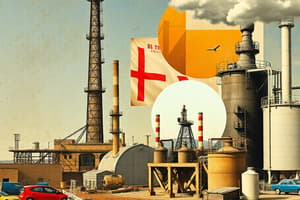Podcast
Questions and Answers
What is the objective of gas processing?
What is the objective of gas processing?
Where does associated gas come from?
Where does associated gas come from?
What are the main impurities commonly found in raw natural gas?
What are the main impurities commonly found in raw natural gas?
Why is water removal important in natural gas processing?
Why is water removal important in natural gas processing?
Signup and view all the answers
What is the impact of nitrogen removal on natural gas energy content and combustion?
What is the impact of nitrogen removal on natural gas energy content and combustion?
Signup and view all the answers
Study Notes
- Natural gas processing is essential for separating impurities and hydrocarbons from raw natural gas for transportation and use.
- Natural gas can originate from oil wells (associated gas), gas wells (non-associated gas), or condensate wells (non-associated gas).
- Associated gas is found in association with crude oil reservoirs, often occurring in the same underground formations as oil deposits.
- Raw natural gas, obtained from wells, is impure and needs to be purified before transportation due to major pipeline restrictions.
- Impurities in raw natural gas include water, liquids, and nitrogen, which are removed through various methods like water removal, liquid removal, nitrogen removal, membranes, adsorption, and cryogenic processes.
- Water removal from natural gas is crucial to maintain natural gas quality standards and prevent corrosion. This is achieved through methods like dehydration, desiccant dehydration, or mechanical refrigeration.
- Nitrogen removal from natural gas is essential to boost energy content and improve combustion efficiency. This is typically achieved using pressure-swing adsorption (PSA) units.
- NGLs (natural gas liquids) are often extracted during the gas processing stage for further refining and commercial use.
- Natural gas processing plays a vital role in ensuring the cleanliness and safety of natural gas for various applications, such as heating, electricity generation, and industrial processes.
Studying That Suits You
Use AI to generate personalized quizzes and flashcards to suit your learning preferences.
Description
Test your knowledge of gas processing with this quiz covering topics such as gas streams from crude oil, natural gas, impurity removal methods, and gas quality standards. Learn about the need for gas processing, the composition of raw natural gas, natural gas liquids (NGLs), and common impurities.




